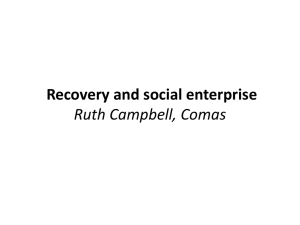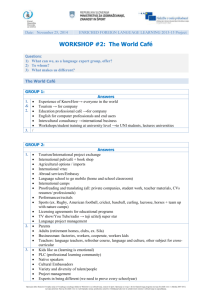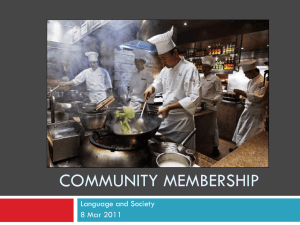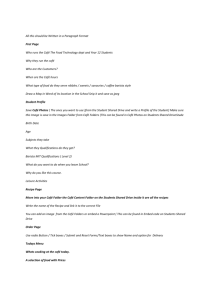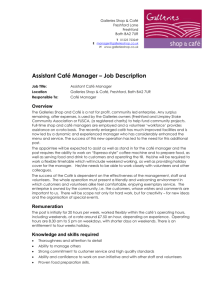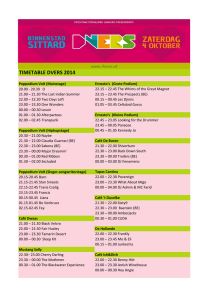Social Café Scheme in Libraries for Adults with anxiety and
advertisement
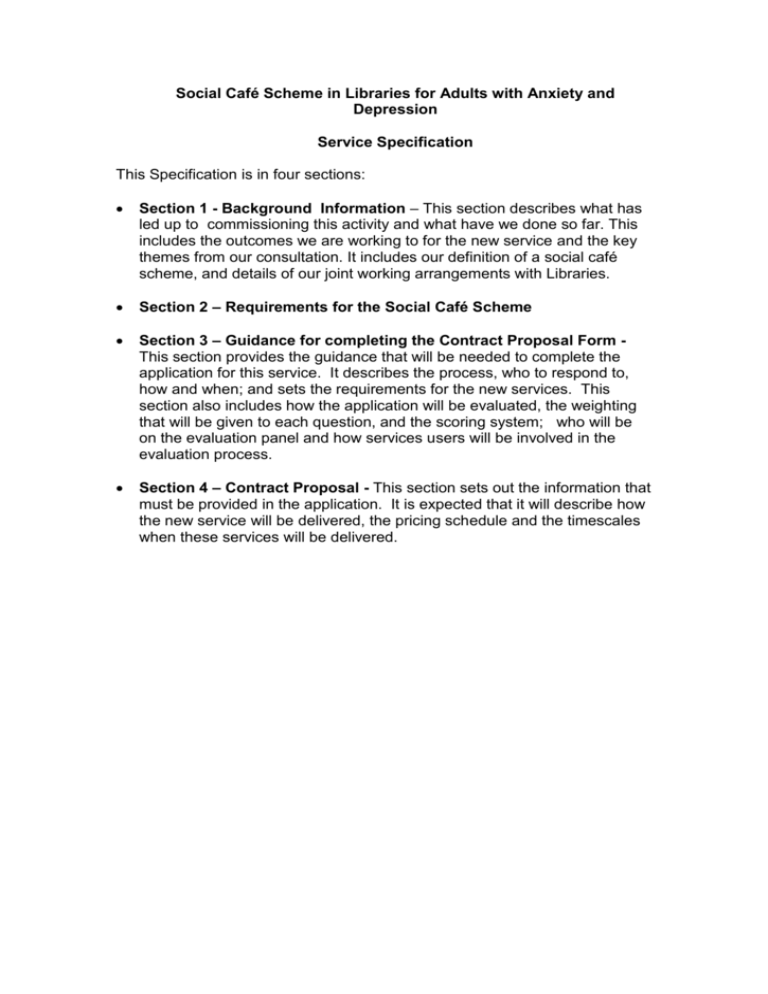
Social Café Scheme in Libraries for Adults with Anxiety and Depression Service Specification This Specification is in four sections: Section 1 - Background Information – This section describes what has led up to commissioning this activity and what have we done so far. This includes the outcomes we are working to for the new service and the key themes from our consultation. It includes our definition of a social café scheme, and details of our joint working arrangements with Libraries. Section 2 – Requirements for the Social Café Scheme Section 3 – Guidance for completing the Contract Proposal Form This section provides the guidance that will be needed to complete the application for this service. It describes the process, who to respond to, how and when; and sets the requirements for the new services. This section also includes how the application will be evaluated, the weighting that will be given to each question, and the scoring system; who will be on the evaluation panel and how services users will be involved in the evaluation process. Section 4 – Contract Proposal - This section sets out the information that must be provided in the application. It is expected that it will describe how the new service will be delivered, the pricing schedule and the timescales when these services will be delivered. Section 1 - Background Information Commissioning Background There are currently 3 Adult Social Care partnership contracts that procure activity provided through “drop-in” arrangements for vulnerable adults with low level mental health issues. As part of the delivery of the Commissioning Landscape these contracts are scheduled to end at the end of March 2013. This gives us the opportunity to commission new activity that builds on the strengths of existing arrangements, improves access to mainstream activities, builds better links with other preventative services and builds individual resilience. Partnership Investment Approach The proposed service will be consistent with the Partnership Investment Agreement approach: Firstly, it will deliver actions and activities that prevent, reduce or delay the need for significant health or social care interventions for individuals (Preventative Support). An important aspect of this is that the preventative impact can be evidenced. Secondly it is an investment in an organisation that is able to contribute extra resources to the project, thereby providing additional benefits for the Council’s investment (Added Value) Thirdly it is consistent with the principles of producing actions and activities with those who need to benefit from them (co-production); building on the abilities and resources of those who seek assistance (asset-based approach); enabling people to gain information, advice and support from actions and activities available to all (universal services); building up the capacity and availability of support within communities and networks (social capital) Key Outcomes to be met by the new service: Reduce social isolation Build resilience Increase independent living Reduce admissions to hospital, residential accommodation or long term care These outcomes will be met by commissioning activity that promotes social networks, access to information and signposting for people who are one or two steps away from having “eligible needs”. This includes regular opportunities for adults with mental health issues, to meet others in a supportive environment, access information and support that enhances their quality of life and ability to learn skills and strategies that promote their independence and good health. Target Group This commissioned activity is targeted at people who are one or two steps away from having a level of need that makes them eligible for self directed support with an individual budget; for people who are struggling with anxiety, depression, panic attacks or other mental health conditions. This target group will benefit from opportunities to meet with others, in a structured scheme that will reduce their isolation and enable them to manage their lives and conditions better. This should reduce the need for further and more prolonged health and social care services. These activities are primarily [but not exclusively] targeted at working age adults. Objectives Reducing social isolation which makes people more vulnerable to breakdown and depression. Help with maintaining friends and a social life Having places that feel safe for people to meet others, get information that helps manage their situation and conditions, particularly for people who do not have access to specialist mental health services Enabling people to share their experiences with one another to reduce stigma and ignorance, both informally and through structured activity so that information is accurate and up to date Improving social connectivity – supporting people to have more social contacts, to go out more, have more satisfying interactions with the people they meet. All interventions need to increase or confirm social contact and social networks Building resilience so that people are more able to cope with their circumstances through access to information, signposting onto appropriate services and opportunities, activity, life skills and coaching, etc Promoting a recovery approach that includes access to volunteering, work and training Promoting and improving the quality of life of people and their inclusion within society and community life. Activities therefore need to create strong links with other services and other opportunities in the community. [e.g. CAB services, physical activities, counselling services, leisure opportunities, volunteer programmes, training and work support] Ensuring that people who access the activities have the opportunity to shape them Given the small investment we have to meet need across the City and to meet these outcomes, we can provide a more comprehensive service with better value for money if we build on existing resources and practice. To this end we have spoken to a number of SCC services and established third sector organisations to explore potential partnerships. We have also looked at the very successful Dementia Café model and will be commissioning three social café schemes Our Definition of a Social Café Scheme A Social Café is a regular event, run by experienced staff and volunteers, providing a relaxed and pleasant atmosphere, where people can drop-in as they need to and, over refreshments, talk with others in a similar situation. While the therapeutic value of refreshments is an essential component of the event, providing a café is not the aim of the scheme. The Social Café scheme will also provide a programme of activities and events that will encourage people to participate in a wider range of activities. It needs to provide information that enables people to access services more effectively and to manage their specific conditions. Three Schemes The three Social Café Schemes will run fortnightly, each one developed with a different partner and in a different area of the city. In brief, the three schemes are: Social Café Scheme in Libraries Social Café Scheme in Partnership with Public Health in the North East of the City Social Café Scheme – City-wide with a central base. This specification is for the Social Café Scheme in Libraries. It has been developed in consultation with Libraries staff, mental health providers and mental health service users. The fee for the scheme is £12,500 per year for 3 years [subject to change due to Budget pressures]. Why we are working in partnership with Libraries. Libraries are a city wide information service that increases people’s access to information and culture in a variety of media locally, regionally and nationally. To develop support for the target group described above and to embed that support within Libraries To increase access to the Library network and all its associated resources for the target group To encompass the planned therapeutic reading and social activities being carried out by Libraries. To co-commission with Libraries a social café scheme to be managed by a provider organisation To develop a co-commissioning approach that can be extended across the library service Section 2 – Requirements for the Social Café Scheme Overarching service requirements: The provider will be required to: Demonstrate your organisation’s previous experience in delivering services to people with mental health issues Demonstrate your organisation’s ability and skills to assess need and manage events/meetings. Demonstrate how you will target services to the target group described above Demonstrate the capacity to bring in support for this scheme from other agencies [e.g debt, health and housing advice] where this is appropriate Demonstrate the added value that your organisation will bring to this scheme Specific service requirements To develop and manage a fortnightly Social Café scheme, at Manor Library, for people with low level mental health issues, to meet with one another on a fortnightly basis in an attractive and supportive environment. To open from 10 to 4 [as a minimum] and for 25 weeks of the year. With Library staff, to develop an annual programme of events, coproduced with clients and including the therapeutic reading development activities being planned by Libraries With Library staff and their partners [including volunteers] to deliver IT training to increase skills, confidence and access to information To have a minimum of 30 people attending at any one session and a minimum of 50 registered throughout the year All events, meetings, programmes to be managed by staff with experience of mental health To recruit, train and support volunteers and to deliver a minimum of 400 volunteer hours per year with an increase of 25% in each if the following two years To work pro-actively with the Recovery and Education Programme in the Sheffield Health and Social Care Trust. Section 3 – Guidance for Completing the Contract Proposal Form Read the background section of the specification to ensure that the aims and objectives for this service are understood Understand the service requirements and describe how these requirements will be met in the Contract Proposal Complete all the questions in the Contract Proposal Provide the supporting organisational documentation asked for in the Contract Proposal The deadline date for submitting contract proposals is no later than 12 noon on the 3rd December 2012. Please note we will only accept electronic applications. Completed proposals and supporting documentation need to be e-mailed to: accountablebody.service@sheffield.gov.uk Proposal Queries We will be holding a briefing session for organisations who are intending to apply for this contract – 10 am on the 14th November. This session will provide an opportunity for organisations to ask for further clarification or information. Evaluation Process There are four questions set out in the Contract Proposal Form, each one with a weighting. It is important to recognise that if any organisation fails to benchmark on Question One on the application [i.e reaches 50%], we will not progress any further with assessing the application. Nor will we consider any organisation which is unable to evidence previous experience of delivering services to people with mental health issues. See below for an explanation of our scoring system Evaluation Scoring Matrix Score Description of Response 0-1.4 Unsatisfactory response, suggesting the bidder would have serious difficulties delivering the required contract standards, or has provided limited information. 1.5-2.4 Unacceptable response, indicating that the bidder would meet only some of the requirements of the contract some of the time. Considerable work would be needed with the bidder to expand on information provided in order for the information to meet the required contractual standards 2.5-3.4 Acceptable response, indicating that the bidder would be likely to meet the basic contract standards, but further work needed to ensure that contract standards will be met consistently. 3.5-4.4 Good response, clearly indicating that the bidder has fully understood and can apply and deliver all the required contract standards. Small amount of work may be needed in some areas. 4.5-5 Response indicating that the bidder has a wholly comprehensive understanding of the contract standards and that the proposed approach will result in the contract standard being exceeded. Please note that failure to achieve 50% of the available points (i.e. 2.5) for any one question will prevent further assessment of the bid. Additionally, bidders that do not achieve an aggregate score of 66% (i.e. 3.33) may not be considered. The applications will be assessed by a panel that includes, Commissioners and Contract Officers from Adult Social Care, the Collections and Reader Development Officer in Libraries, and a representative from Sheffield Health Social Care Trust. The Service Users group will be involved in evaluating Question 4 on the application. If further clarification is required from organisations, we may ask the organisation at short notice to do a presentation to members on the evaluation panel. It is planned that this will take place during the week commencing the 7th January 2013. Decisions We will inform all organisations the outcome of the evaluations by the end of February 2013. The contract start date will be 1st April 2013. Section 4 - Contract Proposal % of Question Guidance score What we will be looking for It is an essential requirement that your organisation, and the staff involved in the Social Café, have experience of dealing with people with mental health issues. Please describe this. 1 What experience, Describe your organisation, its staffing capacity, skills and structure, the type of work you do and 25% resources does your experience in this field of work organisation bring to What other contracts do you hold and this project where else do you get funding.. Demonstrate your organisation’s financial stability for the life of this contract. What additional value does your organisation bring to this contract. 2 30% How will you develop and run a Social Café 3 25% Who will you work with and how will you develop referral pathways in and out of your service 4 20% What systems will you have in place to ensure a continuous improvement in the Describe as fully as possible how you will set up, develop and deliver a Social Café in a Libraries venue. You need to demonstrate how your proposal will meet the outcomes and outputs set out in the specification. Include opening times, who will staff it, what is their experience of mental health issues. Where will volunteers be recruited from and how will you train, supervise and support them. How will you make people feel welcome and at home. Provide a indicative program for the first 12 months. Include costs for all of the above. Demonstrate your knowledge of local organisations and services and how your organisations works with them. What relationships, working practices will you develop with other organisations to meet the outcomes described for this client group. How will people get to know of your scheme and how will you recruit clients How will you encourage attendance from clients in BME communities Describe governance for the scheme. How will you ensure that service users are involved in the development and shaping of the café service you offer and how will service users be involved in this. How will you review and evaluate the service and how will service users be involved in this What arrangements/exit plans will you put in place at the end of the contract. Appendix 1 Outputs/Key Performance Indicators for Social Café in Libraries It is expected that through the delivery of this contract the provider will produce a number of key outputs/KPI’s. These will be negotiated at the contract award stage. Number of services users Number of Volunteers recruited Number of Volunteer hours ( 400 hrs first year, 500 hrs second year , 600 hrs final year) Number of service users taking part in leisure and social activities outside of the Café. Number of referrals and signposting onto other organisations in the city Number of referrals into the Café Scheme from health and social care organisations Number of activities that service users are signposted into and participate in Number of service user engaging with volunteering, education, training and work related activities In addition to above on a quarterly basis the provider will be required to report back to Sheffield City Council on the following activities: Evidence of a greater use of Library activities and resources Active working relationships with city wide organisations Evidence of progression onto self help groups and activities. Pen pictures and case studies of individual progress. Where there is evidence, reporting back on the number of clients who have maintained or improved their capacity to manage their mental health condition, reduce lapses and live more independently. Evidence of increased social activity for service users outside the fortnightly social café. The provider will be required to send quarterly diversity monitoring reports that will include information on gender, age, ethnicity and post code.

